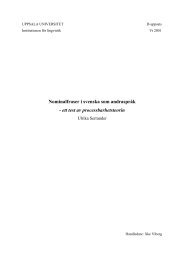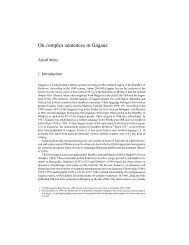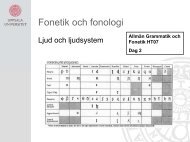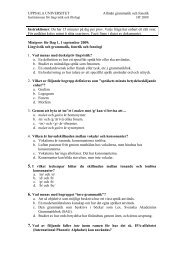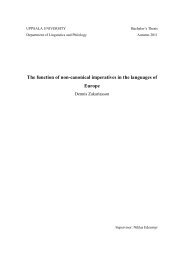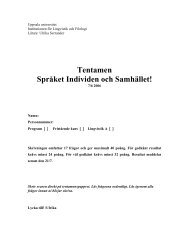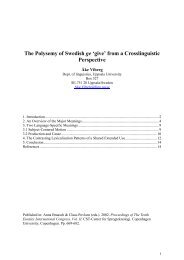Preaspiration in the Nordic Languages: Synchronic and Diachronic ...
Preaspiration in the Nordic Languages: Synchronic and Diachronic ...
Preaspiration in the Nordic Languages: Synchronic and Diachronic ...
You also want an ePaper? Increase the reach of your titles
YUMPU automatically turns print PDFs into web optimized ePapers that Google loves.
than <strong>in</strong> men’s. 1 My own impressionistic observations of Swedish speakers<br />
suggest that a tendency to preaspirate is quite common <strong>in</strong> Swedish,<br />
<strong>and</strong> I would agree with Fant et al. that women tend to preaspirate more<br />
than do men. In fact, this applies not only to speakers of CSw, but also to<br />
speakers of most of <strong>the</strong> ma<strong>in</strong> varieties of Swedish, such as Skånska,<br />
Dalmål, <strong>and</strong> Jämtska. It should be stressed, however, that even if one can<br />
f<strong>in</strong>d evidence of consistent early glottal abduction <strong>in</strong> some speakers, this<br />
does not mean that preaspiration is a particularly noticeable feature of<br />
<strong>the</strong>ir speech.<br />
The f<strong>in</strong>d<strong>in</strong>gs for <strong>the</strong> four CSw speakers <strong>in</strong>vestigated here (cf. Ch.<br />
4.2) suggest that <strong>in</strong> CSw it is not only <strong>the</strong> stops /p t k/ that tend to be<br />
preceded by preaspiration, but also <strong>the</strong> fricatives /f/, // 2 <strong>and</strong> /s/. This<br />
means that preaspiration is not a particular feature of stops, but a general<br />
characteristic <strong>in</strong> production of voiceless consonants.<br />
The word-medial <strong>in</strong>tervocalic lenis stops <strong>in</strong> Swedish are generally<br />
produced as fully voiced stops, although <strong>the</strong>y are quite often voiced<br />
fricatives or approximants. Word-<strong>in</strong>itial stops are generally voiced as<br />
well, even when <strong>the</strong>y occur utterance-<strong>in</strong>itially.<br />
The contrast between /l m n/ + /b d g/ <strong>and</strong> /l m n/ + /p t k/ clusters<br />
lies ma<strong>in</strong>ly <strong>in</strong> <strong>the</strong> voic<strong>in</strong>g of <strong>the</strong> stops. Sonorants before stops are usually<br />
fully voiced, <strong>and</strong> do not appear to have any significant tendency to become<br />
voiceless before <strong>the</strong> voiceless fortis stops. In o<strong>the</strong>r words, <strong>the</strong> preaspiration<br />
tendency <strong>in</strong> CSw does not extend to <strong>the</strong> sonorants <strong>in</strong> any significant<br />
degree. Also, fortis stops that follow sonorants are not more<br />
prone to be produced with postaspiration than are <strong>in</strong>tervocalic stops.<br />
3.6 Non-normative preaspiration <strong>in</strong> Sc<strong>and</strong><strong>in</strong>avia<br />
As <strong>in</strong>dicated <strong>in</strong> section 3.5.5, my impression is that non-normative preaspiration<br />
occurs commonly <strong>in</strong> stop production <strong>in</strong> all of Sweden, <strong>and</strong> <strong>in</strong><br />
fact across <strong>the</strong> whole of <strong>the</strong> Sc<strong>and</strong><strong>in</strong>avian pen<strong>in</strong>sula (see also Helgason<br />
1999). Apart from <strong>the</strong> data on CSw provided <strong>in</strong> Chapter 4, <strong>the</strong>re are three<br />
1 This may be viewed <strong>in</strong> light of Stölten’s (2002) f<strong>in</strong>d<strong>in</strong>gs that Arjeplog females have<br />
longer preaspiration than <strong>the</strong> males, as well as <strong>the</strong> f<strong>in</strong>d<strong>in</strong>gs of Foulkes et al. (1999) that<br />
female <strong>and</strong> child speakers of Tyneside English tend to preaspirate, but not males.<br />
2 Traditionally transcribed as //.<br />
– 89 –



